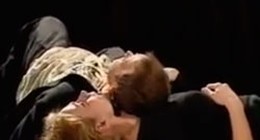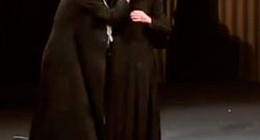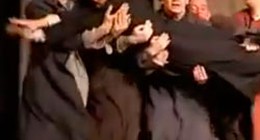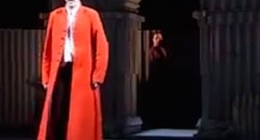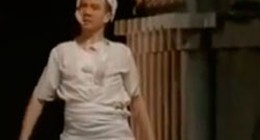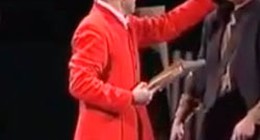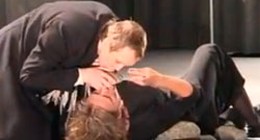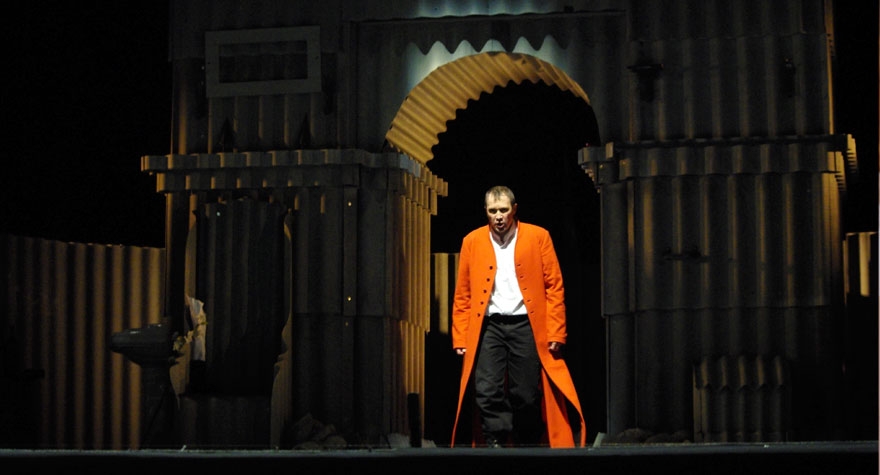

The director, Eimuntas Nekrosius (Lithuania), has been a headliner of major festivals in Moscow and St Petersburg for many years and an icon of the intellectual metaphor theatre. Tyranny and dreaming, a desire for absolute freedom and moral slavery, violence and drive for the beautiful. Caligula, played by Evgeny Mironov, is not a self-centred despot, but a desperate man who realised that there is no such thing as freedom in the world.
Caligula:
2012 – Laureate of the Golden Mask national theatre award in a nomination “the best male part in drama” (Evgeny Mironov)
2014 – Laureate of the Star of Teatral in a nomination “the best male part” (Evgeny Mironov)
The performance was shown in many Russian cities and towns: St Petersburg, Voronezh, Omsk, Saratov, Ekaterinburg and others. It was shown at many major European festivals.
July 1, 2, 2011 – at the famous international festival Villa Adriana in Italy, at the atrium of the emperor Hadrian’s country villa in Tivoli.
October 27, 2012 – at the international theatre festival in Vicenza on the stage of the world famous theatre Teatro Olimpico.
Until 2014, the role of Kerey was played by a Russian honoured artist Аlexey Devotchenko
"Engraved on my memory is Evgeny Mironov's final look the look of the martyr who failed to put up with the finiteness of existence, of the man who is capable of being cruel only to himself. It is the case when the theatre of Eimuntas Nekrosius especially deserves to be called not so much metaphorical as psychological. Never before had the director so closely examined the man's inner universe and the subtlest impulses of his soul. Perhaps the reason is that never before had Nyakroshus had an actor capable of expressing this universe with such incredible poignancy and profundity"
Marina Davydova, "The Moon for the Emperor. Eimuntas Nekrosius Staged Albert Camus' Caligula", Izvestia.
"In his stagings Eimuntas Nekrosius never gives ready-made answers. He sets the audience to thinking and feeling as intensely as the actors on stage. And it takes an unaided eye to see what titanic effort the actors are called to apply basically in the absence of visual effects. In the end of the play Evgeny Mironov is lugging big rocks up and down the stage (a favorite element of Nekrosius' set design) but one has the feeling he has been doing this throughout all the four hours that the play runs. His character is not a tyrant, a devil incarnate or an insane neurotic. And his stern look from under the brows that one can see on all playbills basically matches the scenic image created by the actor. This Caligula is a stranger to affectation. He speaks in a quiet voice and in the beginning looks like an embarrassed boy. More than anyone else he is torturing himself. He is the Hamlet of the times of Nero and Seneca, doomed to take vengeance on everyone, people and gods, for the disgusting imperfection of the world".
M. Shimadina. "Evgeny Mironov Played the Blood-Thirsty and Soft-Voiced Emperor". Trud.
"The performance rotates around four couples: Caligula-Ceasonia (Maria Mironova's performance is a curious combination of parody, grotesque, tragedy and melodrama); Caligula-Scipio (Yevgeny Tkachuk performs a gentle young poet in love with Caligula to the extent of forgiving him the murder of his father); Caligula-Cerea (a fearless dissident performed by Alexi Devtochenko) and finally Caligula and faithful Helicon. This is probably Evgeny Mironov's best role. His invariably pale face (no wonder that he is striving to get himself the Moon) is a clear sign of the passions that are scorching him from within. His aphorisms are products of the agonizing pain: "To rule means to steal. I want to steal openly". But the play is not confined essentially to these maxima. The odd horror in the eyes of Cesonia and Scipio, both in love with Caligula; Caligula's frozen pale face and the bizarre movements of the palms of his hands; maybe the almost obliterated piece of soap and the cord strung from one wing to the other on the very edge of the stage… It rings for the last time to keep us tense in the absence of catharsis or hope..."
Alyona Karas. "The Poetry of Tyranny". Rossiyskaya Gazeta.
"This Caligula is not so much the flickering image of the 20th century's tyrants as the vague and distant shadow of Hamlet and Paul I. As he humiliates and jeers at the others, with childish enthusiasm entraps and entices the fathers and sons of the people he executed and mocks the gods one has the feeling that he is torturing his victims in the desperate effort to extract whatever godly is left in them. He transgresses all thinkable and unthinkable limits possessed by the St. Vitus's dance kind of freedom and finally gets slain by the avenger. Like some monstrous Diogen he longs for someone to destroy him for his sins of which in Nekrosius' interpretation his is only too well aware".
Yelena Dyakova. "The Little Soldier's Boot Caesar in the Age of Felt Boots". Novaya Gazeta.
"The pathetic bunch of patricians who have made up their minds to break off from the fence resemble a pack of dogs. But the only domestic dog entitled to live in the kennel is the Emperor's lover Ceasonia. Out of love for the Emperor she has steam-ironed any sense of compassion in her and developed the habit of chatting easily about executions and tortures. A stylish beauty and brilliant actress Maria Mironova as Ceasonia eventually loses her luster. Her step is getting increasingly fidgety and puppet-like. As she runs across the stage she produces the cries of a seagull. Above all she seems to be getting shorter as day after day she is compelled to listen to the madman's speeches in justification of his doings".
"One of the most expressive and image-bearing scenes in Caligula is the contest of poets who by the will of the tyrant must improvise on the theme of death. The poets appear, each carrying under his arm a pair of paper legs dressed in black socks. Presently the contest develops into a degrading show of shaking and breaking limbs and as soon as the judge gives a whistle they go promptly into the garbage heap".
"Evgeny Mironov plays Caligula as 'the martyr of delusion' dreaming of the moon and depressed by the lust that cannot be satisfied. The latter-day rival to Heaven, he, like Ibsen's Brandt, declares:'Everything or nothing'"
In a mysterious way, through facial expressions, a series of repeated gestures, sudden moments of silence and motionlessness the actor manages to convey the emptiness of Caligula's soul and the tortures of his heart and mind (hell is not the others as in Sartre, hell is me). In the moments of incredible childishness Evgeny Mironov's Caligula calls up Mikhail Chekhov in the Vakhtangov Theatre's production of Eric XIV and the fantastic fluctuations from anger to lyricism and gentleness in the demeanor of the ruler from another country and another age.
As he rushes toward his death with the famous exclamation'Into the history, Caligula! Into the history!' Evgeny Mironov's personage doesn't smash the mirror as is written in the play. The fragments of the mirror are already there — those that were put in his bosoms in the very beginning and those that the rebels were armed with. The crowd bares them to assassinate Gaius Julius Caesar Augustus Germanicus also known as Caligula. It brings to an end the bloody' staging' of the self-destruction experiment performed to the music of Wagner and Brunker (one may recall in this connection Nyakroshus' recent works in opera theatres across the world).
Those who expected Eimuntas Nekrosius to come up with a theatrical reflection about the regime should be disappointed. The regime is what Nekrosius is least concerned with. In Caligula he remained true to himself — the scope of his interests is still metaphysics and anthropology. His Caligula is not so much a merciless ruler as a man on the brink".
M. Halizeva. Misanthropic Lyricism. Ekran I Scena.
"Mironova's performance is very stylish, at times almost grotesque, but there is something distressingly human in it, which produces an unwanted lump in the throat. Brimming with emotions (which is absolutely atypical for an existentialist drama) is Scipio, possessed by the tragic romantic love that is bigger than the leaden reality and the everyday necessities. And Caligula's watchdog Helicon (Igor Gordin), half an idiot and half a saint, determined to stay with his master to the end for he ranks loyalty above all other qualities and motives and despises the patricians in Caligula's retinue for lack of any endowments.
Mironov plays the martyr of the idea. He has no pity for himself or for the others. He cares for nothing except the absolute beauty which he cannot reach like he cannot reach the moon.
'Too many people dead', he says. And he kills his wife Ceasonia almost tenderly as he puts his head on her throat and she suffocates in this last act of love. Meanwhile the 'too many people dead' keep walking on stage along with those who haven't been killed yet. For in the world fantasized or created by Caligula the borderline between life and death has been erased. The ghost of his sister Drusilla (Yelena Gorina), this red-haired elf who has come from Nekrosius' previous stagings, burns her bare feet as they touch the 'burning' ground. And when Caligula touches the cord strung along the footlights it breaks producing a mystical echo".
N. Kaminskaya. "The Power and the Celestial Line of Command. Eimuntas Nekrosius' Caligula at Theatre of Nations". Kultura.
"Mironov's soft face lets the evil in quite imperceptibly. His Caligula is not a monster. It's his standards that are monstrous. His rebellion is furiously quiet. As he throws up spite, sets his deadly experiments with death or is comically absorbed in self-admiration he never forgets about the main question formulated by Camus in the very beginning:' Is life worth living?"
"As they stand in circle and quickly bandy invisible objects to each other Scipio, Cesonia and Caligula are lit by the gleam of the green years they shared. They call him Kay; they grew up together. And when the patricians are putting fragments of the mirror in the Emperor's bosom one can't help recalling Andersen's Kay whose soul and sight were distorted by the fragment of a broken mirror".
M. Tokareva. "Eimuntas Nekrosius' Caligula". OPENSPACE. RU.
"'Freedom becomes pain and pain liberates' this Jean-Paul Sartre's formula is the key to Evgeny Mironov's performance in the role of the blood-thirsty dictator with the subtle and vulnerable heart obsessed with the desire for the ultimate freedom (the freedom of the will of the gods and of the universal predestination that all men die) and the desire for the unattainable ('I want the moon')".
"On the surface there is the foam of crying actuality. The power has gone so far in its crimes that no retreat is possible. The 'political economy' of this power is as simple as this:'To rule means to steal. Everybody knows this. So I shall steal openly'. Caligula's look, now leaden and then wan, is only too recognizable. But Mironov digs deeper to raise the 'damned' existentialist question: is life worth living? Especially as the world is so disgusting and imperfect? He inoculates himself with cruelty as a medical scientist does with plague. Having taken kickbacks from his subjects in the form of glass fragments he puts them in his bosom and exclaims: from now on he will have to live with this 'shrapnel' wound. Until liberation comes as the crowd of faceless patricians who have been hiding behind the fragments of this mirror. Camus's Caligula croaked to the patricians who were killing him: 'I'm still alive'"
Olga Fuks. "he Broken Mirror". Vechernyaya Moskva.
"The insinuating language in Caligula is harshly out of tune with the language of the modern theatre and with the characteristic yardsticks of Nyakroshus himself. In Caligula Nyakroshus is both familiar and unfamiliar. The cryptogram of the style of Nekrosius renowned for the ability to fully translate words and thoughts into the language of plastique is like entering the Wonderland. The geometric quality and dynamism of this language combined with shattering motor functions of the mise-en-scenes infused with whirlwind or the breath of Eros make theatre historians recall the constructivist inclinations of Tairov or the flourish of Exter's costumes. The actors' gesticulation is strange, unwonted and erratic. They give one the feeling of leeches applied to the body. They seem to appeal:'Learn to read and hurry to live'. According to Nekrosius, a gesture is a thing in itself. One is inclined to suspect that the director is striving to create his own gestus. Once this term was used by experimenter Berthold Brecht to designate his own theory of regenerating the gesture for the sake of sharpening the meaning the gesture should be sharpened to the extent of becoming a cut that produces purifying bleeding".
Vladimir Kolyazin. "Camus's Caligula at the Theatre of Nations. The Protuberances on the Brink of the Endless Performance". Planet Beauty.
"Nekrosius needed this very long play, these four hours of real time to retrace how the healthy man starts living an unhealthy life, how the carbon dioxide of disgust fills his lings causing suffocation. More often than not amnesia is a tricky thing. Nobody and nothing can restore a man's memory of the past, there is no way back or forward, all there is is dead end. Even Cesonia brilliantly performed by Maria Mironova cannot help Caligula return to the ways of goodness for her beloved has a much more attractive 'girlfriend' named Death. With Death it is so fascinating to play blind man's buff. Next to this monster Death little by little turns into a sister of mercy servicing the endless conveyor of victims with brief smoke breaks. And this is a human tragedy rather than a myth".
Lyubov Lebedeva. "Love and Power Are Incompatibles". Tribuna.
"It is precisely the magic of Caligula's personality and the charisma of the true artist that make his retinue hesitate so long before resolving to take part in the conspiracy. Throughout the play only two personages (not including Helicon), the Emperor's beloved Cesonia and his old friend Scipio will not yield to the animal fear of death that turns the high-ranking Romans first into the people who 'keep silent' and then into murderers. Maria Mironova plays a woman who is sacrificially in love and who degrades from the lady of pleasure in her prime into the half-crazy vestal with disheveled hair and dark shadows under her eyes betraying many sleepless nights of vigil. Her feelings are best expressed in the phrase that obviously comes from the heart and sounds like a spit into the senators' faces:'Like all soulless people you can't stand the man who has soul in abundance'. Only Scipio seems to understand her. Evgeny Tkachuk portrays a refined young poet who desperately and laboriously tries to understand Caligula and at last this understanding has the effect that the murder of the father is forgiven not to the Caesar but to the friend. The quiet dialogue between Caligula and Scipio is one of the most powerful scenes in the play. It is the first instance when the armor of inhuman logic is scrunched up by the sincerity of human feelings".
Jeanna Zaretskaya. "Tyrant Sapiens". Fontanka.ru
"From the very first seconds of the play director Eimuntas Nekrosius throws the audience into the vortex of the traditional existentialist metaphors and the images who punch in the guts. What we see is the populous Roman court reigned consecutively by the joyful boy, the embittered brother of the dead sister and finally the murderous tyrant. The regeneration, or rather degradation of Caligula played by Evgeny Mironov takes place against the background of the slated triumphal arch, the doghouse that is also slated and a couple of slated thrones. The imperial forms likened to heaps of debris that Caligula's courtiers are lugging most of the time. Something is always happening on stage. While Caligula is belching out the cruel truths that everybody is guilty and everyone is unhappy his retinue is laundering/ironing/constructing/transporting. This picture typifies all the empires and civilizations — ceaseless bustle against the background of the perpetual power".
Natalia Vitvitskaya. VASHDOSUG. RU.
"Director Eimuntas Nekrosius has his own way of resolving the conflict in Camus's play. His Caligula played by Evgeny Mironov is not a greenhorn who in the fit of delirious pride is craving for the moon. He does rave about the moon but in a different way. Yevgeny Mironov acts out the torments of power. A ruler is doomed to burn out everything human in him because being human means the need for warmth, love, peace of mind and ultimately dependence. A ruler must break off all the contacts of his soul. Therefore Caligula with intentional cruelty kills his father and later his friend and beloved poet Scipio (a brilliant work of actor Evgeny Tkachuk). He surrounds himself with the pack of nonentities who clutch at the throne, encourages the puppet opposition (conspirator Cerea is played by Alexi Devotchenko with spite and subtlety). But everything which is forbidden tenderness, trepidation, love is relentlessly haunting Caligula in the image of barefooted Drusilla. Like a bird she is flying about the grey slate symbolizing the abode of the powers that be. This forbidden fruit is the moon for which the Caesar's souls is yearning quite against his will".
Elena Levinskaya. Teatralnaya Afisha.

